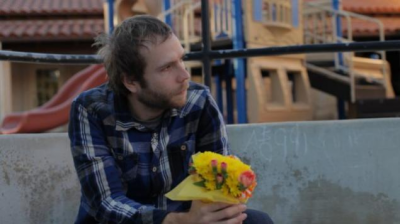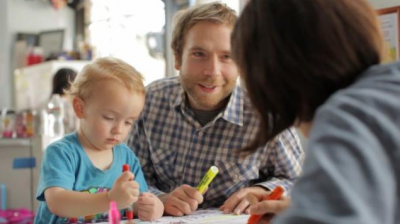By: debbie lynn elias

It’s always a joy to speak with a fellow Philadelphian and a Philadelphia filmmaker at that. Having already been tweeting back and forth when his latest film, THE END OF LOVE, debuted at Sundance, it was nice to sit down for a face to face chat, talking about not only his writing, directing and acting in the film, but working with his then 2-year old son, Isaac. As I told Mark from day one, Isaac steals the film and the heart.
A heartfelt story about the struggles of single fatherhood, Mark draws much into THE END OF LOVE from his own experiences growing up in North Philadelphia with his single mother. Often homeless and struggling for money himself growing up, he builds on that emotional and tangible foundation by fictionalizing the story in the present with himself as a widowed father and struggling actor. Melding reality with fiction, he not only casts Isaac, but then calls on numerous Hollywood pals to play themselves in real time segments, taking us into this seamless world of “being in the present.”
With verite-styling, Mark paints a picture that is disarming, sweet and poignant, capturing the fragile silent beauty of a father’s love juxtapositioned against the harshness of life with the emotional scarring it can cause. Feeling as if Mark is holding your heart in his hand, as I told him already, this shouldn’t be called THE END OF LOVE. This is, in truth and fact, the story of Love Never Ends.
I watched THE END OF LOVE on VOD the day it became available. You had me in tears. Knowing your background and how you grew up in Philly and to see where you are now, to see a film like this and to see it after you coming off For A Good Time Call, it does my heart good.
That’s so amazing. That’s so cool.
And then I see you pull off THE END OF LOVE, writing, directing and performing. Talk about a shift! By the way, where is he? Where’s Isaac?
[laughing] He’s at school. He’s at school right now. He’s 4 1/2 now.
How old was he when you shot?
He was almost 2 1/2 years. It’s crazy. I just watched the movie for the first time in a while and had this craaazy reaction to it. It’s really the first time I saw it where I feel like completely objective. I had this outer body experience. It wasn’t me watching. It was fascinating to me. It really affected me. It was also just so crazy to see Isaac at 2 because now he’s this little man, and I’m like, “Oh, God!”
And I bet he’s even more precocious now.
He is! He really is. I feel like the luckiest dad, the luckiest guy. I got so lucky with him. He is just an amazingly sweet, thoughtful, intelligent little boy and he’s my whole world. That’s why I was, “This is my whole world and writing for me and filmmaking for me is this exploratory process, this therapeutic process of working through themes and things in my life. Let’s make a movie together. Let’s make a movie that shows a father and son in a way that’s authentic and real.”
Interesting to me is that with this film you have a seamless blur between fact and fiction. You have “fact” that’s interloping within the fiction and you almost don’t realize it. People that don’t recognize Jason [Ritter], whom I adore, Aubrey [Plaza], Michael [Cera], Jake [Johnson] unless people recognize them, these are just other actors playing a role. But for those that recognize the actors, especially a younger audience, which I think because of the cast is who you will attract, I think this blend of a fictional story with certain actors playing roles and then other actors being themselves, it will pique peoples’ curiosities.
I think so, too. I’ve already experienced that on some levels with people and their reaction. That whole thing and that party sequence and the people that were there, that was real. It was a really fascinating sequence to shoot. Everyone came up to me afterwards and was like, “Mark, thanks. This was so cool the way you pulled this off.” I just invited people and had the cameras role. I told everyone where I was as a character and who I am before we started filming and we just shot in real time throughout the whole night. Of course when you’re working with other really great actors who are conscious of cameras being around and cannot think about it, it was really great, really fascinating. It was awesome to have that support, too, from my peers and people who I really admire who were just willing to show up and be there.
How did you decide to take this particular tact with this meld of reality and fiction?
I’ve always been obsessed with naturalism in film, just as an actor.
My first thought when I get a script is, “How can I make this sound real?” I think most actors go through that but I think I go to a place where it needs to feel so real to me. There have been certain films throughout the years that I’ve seen and they kind of transcend the medium in the sense that I’m not just watching a good performance. I feel like, “Who are these people” and I’m totally immersed in that world. This was my attempt to try and do that. I find myself as an actor and also a filmmaker, really going there. In a way, traditional film sets, and especially after this movie and going and doing a couple other films as an actor, it was really hard for me because now I’ve opened up this world of a different way of doing things and I kinda want to do it that way. [laughing] I don’t want to have slates or trailers or people around. I just want to orchestrate these elaborate set-ups and have people inhabit characters.
I’m fascinated with this whole format that you have going because you don’t see it that often. And when you do, it often doesn’t work. But THE END OF LOVE beautifully works. What did you shoot this in?
Thank you. Right? I know. I shot it on Canon 5D camera which is a testament to my DP [Patrice Cochet ]. The gift and the curse with filmmaking now is that, “Okay. Here are these tools that anyone can use.” And those cameras have severe limitations. But, we couldn’t make this movie with even just a bigger camera [because] it would interfere with the intimacy and would take Isaac out of it. So we used the camera’s limitations and turned it into its strengths. We didn’t try to fight against the limitations. We embraced them. That became aesthetically part of the style and that’s why it still looks very cinematic.
It’s very verite. And the look, especially where you have flashbacks with old home movies, is all very seamless. You don’t have stark, super-saturated digital contrast. So many people get a digital, be it the Red or an Arria or whatever, and they go nuts with “how laser sharp can we make it”. You had me wondering if you went back and pulled out a handheld Super 8mm.
I know. We shot on those 5D’s and we used some really great lenses and were just very conscious of the lighting. When I did the DI and color correct, some filmmakers have a tendency to go a little over the top with it once you start to see how much you can play and really go crazy with the over-saturation and the crispiness, but we just were really conscious of making it feel beautifully raw, soft and elegant and rough at the same time. Some of these cameras are sharp.
For your character in the film, how easy or how difficult was it for you to lapse into the whole struggling parent, no money, can’t really pay your way persona? How much an emotional tug was that for you as you are essentially reliving your past?
Totally. In some ways, it’s very much my present day life as well. As someone who makes predominantly independent film, and decides to make my own film, I’m not on a crazy successful tv show.
Like he does in the film, Jason Ritter should really be handing you money!
[laughing] I know! It was easy enough [reliving the past] but what was really difficult about was just being a little bit more intense and sad around Isaac which, although it was nuanced and subtle, in a way that I’m not normally. It was difficult seeing the impact it had on him. That’s why we were working in really short bursts of time, like 15-20 minutes and we’d be done and be out on the playground and playing. That was hard.

Did Isaac ever look at you and say, “Daddy, what’s the matter?”
Yea. More than once, definitely. When we were at the graveyard, the reason why he cried was that he was feeling tension and stuff. It’s funny. If people could see the behind-the-scenes! With that scene, as soon that moment was breaking, I’d pick him up and do “Whoo!”, we’re playing, a little crazy. But, I know when Isaac is 10, 11, 12 years old and I sit down and get to show him this movie he’s gonna be like, “Dad, dude, thank you. This is pretty amazing. Thanks for making a movie with me at 2.” Any and all the fleeting moments of “What’s going on with my dad?” will be washed away because we have this really cool thing together.
But he’s also going to say, “Please don’t show this to my friends.” You do know that, don’t you?
[laughing] He might! He totally might! He totally might! He probably will! And of course I’m going to. I’m going to show it to all his friends. His first girlfriend, his first love, “Here take a look at this!”

Through this process with making THE END OF LOVE, what did you learn about yourself?
It reinforced this “thing” that I think everyone struggles with, that I struggle with, of not being present. This whole movie for me was an exercise in remaining present because it’s all improv, and my child, Isaac, only has the ability to do that. Most children do. They’re just going from one moment to the next. They’re not really thinking about, dwelling on the past or the future. And when they do, it’s really minuscule and they get over it really quickly and they’re right back to what’s going on right in front of them. I have tendency to think about my past a lot, and think about my future. It gets me out of the moment and then I wonder, “why am I not feeling so great? What’s going on?” And it’s because I’m over here or over here. As a parent, you’re really a great parent when you can be present with your child. That’s really all parenting is at its core. You will be a better parent if you are there with your kid, with whatever’s going on right now. You take the time to answer their 49 million questions, one after another, listen to their stories, and are there with them and can pick up really how they’re feeling. For me this was one big reinforcement of, “Just stay present. Just stay present. Take it moment to moment and you’ll be happy. You’ll be a good dad and you’ll have a higher quality of life.”
A true champion of the homeless in Philadelphia, are you still doing work with them and organizations there?
Oh, totally. My mom is still in North Philly right off of Lehigh. She actually just ran for Vice-President with the Green Party. She was the Green Party’s vice-presidential nominee. That’s my existence.
Is there a specific group that you guys work with which I can pass along to my readers?
Yes. The Poor People’s Economic Human Rights Campaign. http://economichumanrights.org/
Mark Webber. Philadelphian. Philanthropist. Filmmaker. Father. A winning combination no matter how you look at it.
#











